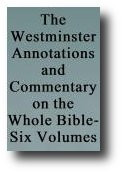 Loading... Please wait...
Loading... Please wait...- SWRB Home
-
Free Resources
- Short Listings Of Free Reformation & Creation Resources
- Free Reformed, Puritan, Covenanter and Creationist Videos
- Thousands of Links to Free Audio, Video and Printed Resources
- Free Puritan Books, Reformed MP3s, and Calvinist Videos
- Puritan Quotes, Free Reformation MP3s, Reformed Books and Calvinist Videos From PuritanDownloads.com On FaceBook
- Shipping & Returns
- Blog
- Privacy Policy
- Contact Us
- Payment Options
- Help
-
About Us
- Sitemap
Pastor Scott Brown, on the left in the video above, is the Director of the National Center for Family-Integrated Churches (NCFIC)
Resource Categories
- PURITAN HARD DRIVE REVIEWS
- PASTOR ROB VENTURA ON THE PURITAN HARD DRIVE
- DR. VODDIE BAUCHAM, JR. ON THE PURITAN HARD DRIVE
- R. C. SPROUL ON SWRB
- DR. JOEL R. BEEKE ON THE PURITAN HARD DRIVE
- PASTOR GREG L. PRICE ON THE PURITAN HARD DRIVE
- DR. MATTHEW MCMAHON ON THE PURITAN HARD DRIVE
- PASTOR SCOTT BROWN ON THE PURITAN HARD DRIVE
- PASTOR W. J. MENCAROW ON THE PURITAN HARD DRIVE
- JOAQUIN FERNANDEZ ON THE PURITAN HARD DRIVE
- PASTOR DAVID SILVERSIDES ON THE PURITAN HARD DRIVE
- JOHN HENDRYX ON THE PURITAN HARD DRIVE
- PASTOR KEVIN GUILLORY ON THE PURITAN HARD DRIVE
- RICHARD BENNETT ON THE PURITAN HARD DRIVE
- DR. KENNY RHODES ON THE PURITAN HARD DRIVE
- JUSTIN RAWSON ON THE PURITAN HARD DRIVE
- PASTOR JAMES WALLACE ON THE PURITAN HARD DRIVE
- PASTOR RICHARD GAGNON ON THE PURITAN HARD DRIVE
- PASTOR JOE HAYNES ON THE PURITAN HARD DRIVE
- DR. STEVEN DILDAY ON THE PURITAN HARD DRIVE
- PASTOR ANDREW COMPTON ON THE PURITAN HARD DRIVE
- TERENCE ELLARD ON THE PURITAN HARD DRIVE
- PASTOR JERRY JOHNSON ON THE PURITAN HARD DRIVE
- PASTOR DAVID PETRIE ON THE PURITAN HARD DRIVE
- JIM DODSON ON THE PURITAN HARD DRIVE
- PASTOR BRIAN SCHWERTLEY ON THE PURITAN HARD DRIVE
- PASTOR PHIL GIBSON ON THE PURITAN HARD DRIVE
- MEL R. EVERINGHAM II ON THE PURITAN HARD DRIVE
- PAUL BLYTH ON THE PURITAN HARD DRIVE
- STEVE KETTLER ON THE PURITAN HARD DRIVE
- D. M. (CALIFORNIA) ON THE PURITAN HARD DRIVE
- MICHAEL CAUGHRAN ON THE PURITAN HARD DRIVE
- WIILIAM NOPPER IV ON THE PURITAN HARD DRIVE
- LINDA THERIAULT ON THE PURITAN HARD DRIVE
- WILLIAM WARNOCK ON THE PURITAN HARD DRIVE
- ROBERT KOH ON THE PURITAN HARD DRIVE
- WHAT'S ON THE PURITAN HARD DRIVE?
- ALL PURITAN HARD DRIVE VIDEOS
- PHD-ODE INSTALLATION VIDEOS
- COMMENTS ON SWRB
- ALL PURITAN QUOTE VIDEOS
- PURITAN HARD DRIVE SCREENSHOTS
- PURITAN HARD DRIVE MINISTRY AND DONATION OFFERS
- TABLE OF RESOURCE CATEGORIES
- Advanced Studies
- SWRB SERMONAUDIO MOBILE APP
- Apologetics
- Assurance
- Attributes and Holiness of God
- Augustine
- Banner of Truth
- Baptism
- Beginners
- Bibles (Geneva, KJV, Hexapla, etc.)
- Biblical Counseling
- BIBLICAL HD COLLECTION
- Biblical Interpretation (Hermeneutics)
- Biographies and Autobiographies
- Calvinism and the Sovereignty of God
- CALVINISM HD COLLECTION
- CALVINIST CLASSICS HD COLLECTION
- Charles Spurgeon
- Children's Books
- CHRISTIAN EDUCATION HD COLLECTION
- Christian History
- Church Government
- Civil Government and Resistance
- CLASSIC CHRISTIAN HD COLLECTION
- Classic Puritan and Reformed Sets
- Commentaries
- Contemporary Issues
- Covenant Theology and Covenanting
- COVENANTER HD COLLECTION
- Covenanters and Covenanted Reformation
- Creation and Creationism
- Creeds, Confessions and Covenants
- Cults, False Religions, Psychology, Humanism
- Dealing with Affliction, Suffering, and Sickness
- Debates
- Dutch Reformed
- Education and Home Schooling
- English Puritans, Covenanters and Reformers
- Family, Children, Home, and Family Worship
- First Reformation
- Five Points of Calvinism (TULIP)
- For Pastors and Elders
- For Seminary Students
- FREE PURITAN & REFORMATION MP3 AUDIO SERMONS/BOOKS
- FREE PURITAN BOOKS, REFORMATION MP3s, PDFs, VIDEOs
- George Gillespie
- God's Law, The Ten Commandments, etc.
- Greg L. Price on Headcoverings
- Heaven, Hell and the Final Judgment
- Holy Days (Lord's Day, Christmas, Easter, etc.)
- HOME SCHOOL HD COLLECTION
- Intermediate Studies
- John Bunyan
- John Calvin
- John Knox
- John Owen
- Jonathan Edwards
- Justification
- Languages, Dictionaries, Reference, etc.
- LOOK WHO LOVES THE PURITAN HARD DRIVE
- Lord's Supper (Communion)
- Marriage, Courtship, etc.
- Martin Luther and Lutheranism
- Martyrs and Persecution
- Other Protestant Works
- Predestination and Providence
- PRESBYTERIAN HD COLLECTION
- Presbyterians and Presbyterianism
- Prophecy, Antichrist, and Eschatology
- PROTESTANT HD COLLECTION
- PSALM SINGING MP3s (COMPLETE SET)
- Psalters, Psalm Singing and Music
- Puritan Facts
- PURITAN FAST SERMONS (1640-1653) - 34 VOLS SET
- Puritan Fast Sermons 1640-1653
- PURITAN HARD DRIVE
- Puritans and Puritanism
- REFORMATION HD COLLECTION
- Reformation History
- Reformed and Puritan Classics
- Reformed Baptist
- REFORMED BAPTIST HD COLLECTION
- REFORMED HD COLLECTION
- REFORMED PRESBYTERIAN HD COLLECTION
- Reformed Presbytery, RPNA Protesters, etc.
- Reformed Theology
- Reformed Worship, The Regulative Principle, etc.
- Roman Catholicism, the Jesuits, Islam, etc.
- Salvation and Evangelism
- Samuel Rutherford
- Sanctification, Prayer and Holiness
- Scottish Covenanters
- Scottish Presbyterianism
- Scripture Song MP3s (Psalms and Bibles Verses)
- Second Reformation
- Separation, Unity, Uniformity, etc.
- Sermons and Sermon Collections
- Solemn League and Covenant
- Theology and Doctrine
- Third Reformation
- Thomas Watson
- Westminster Confession, Assembly and Divines
- Authors (All A to Z)
Phone Orders:
(780) 450-3730
To obtain free Reformation books, Puritan MP3s and Calvinistic videos, SWRB discount coupons, etc., add yourself to SWRB's Puritan and Reformed email list by using the form above.
The Westminster Annotations and Commentary on the Whole Bible (Six Volume Set, 1657) Annotations Upon all the Books of the Old and New Testament... by Westminster Divines
Resource Details
Resource Description
The Westminster Annotations and Commentary on the Whole Bible (Six Volume Set, 1657) Annotations Upon all the Books of the Old and New Testament: This Third, above the First and Second, Edition so enlarged, As they make an entire Commentary on the Sacred Scriptures: The like never before published in English. Wherein the Text is Explained, Doubts Resolved, Scripture Parallel'd, and Various Readings observed; By the Labour of certain Learned Divines thereunto appointed, and therein employed, As is expressed in the Preface
The preface (found in the first volume) recounts not only a short history of the English Bible, but sets forth the great advantage to true Religion which accrues (contrary to the mysticism of the Anabaptists and the anti-intellectualism of the modern backsliding church) when faithful notes are "bound in" with the Scripture text -- this bringing forth nothing different than the effect generated (through God's grace) by faithful preaching, faithful commentaries, faithful creeds, faithful covenants, faithful confessions, etc. Pointing out that this blessing from God was never more obvious than in the case of the Geneva Bible and its marginal notes (and that the people knew it to be so when they were left with Bibles without annotations honoring to God), the preface further states, "hence were divers of the Stationers and Printers of London induced (by the people--RB) to petition the committee of the Honourable House of Commons, for licence to print the Geneva notes upon the Bible, or that some notes might be fitted to the new translation: which was accordingly granted, with an order for review and correction of those of the Geneva edition, by leaving out such of them as there was cause to dislike, by clearing those that were doubtful, and by supplying such as were defective. For which purpose letters were directed to some of us from the Chair of the Committee for Religion (in 1648--RB), and personal invitations to others, to undertake and divide the task among us, and so cometh in our part, whereof we shall give the world a true and just account in that which followeth." The detailed account which follows in the preface is fascinating, mentioning, among many other things, the divines' "use of... the Dutch Bibles... set forth at... Holland, by order of the States."
The diligence given, the energy expended, the obvious humility, and the fearful trembling before God's Word which is evident in these commentators makes this truly a classic Puritan work -- a work of great value! Just knowing, as Barker points out, that this commentary was "prepared mostly by Westminster divines, by order of Parliament, at the time of the Assembly" (Puritan Profiles, p. 37), certainly bodes well for the level of scholarship it contains. Moreover, with Gouge, one of the most respected English Covenanters at the Assembly playing a major role, the thoughtful student of Scripture and history ought to take note: for a theological feast of mature Puritan thought surely awaits those that sup at this table. Esteemed, by the mid-1640's, "as the father of the London Ministers," Gouge was elected as Assessor for the Westminster Assembly on Nov. 25, 1647. His detractors sometimes called him an "arch Puritan" (cf. Ibid., p. 35). Dr. Gouge's "share of the useful work consisted of Kings, and the subsequent books down to Esther, inclusive" (Smith, Select Memoirs of English and Scottish Divines, p. 534). Most of the others chosen to this work had similar credentials, though not all exhibit equal proficiency and some later backslid from attainments reached at this point. Nevertheless, when the commentators were first chosen, these Annotations were produced by some of the most qualified English Puritans -- as a historical high water mark for Puritan scholarship was beginning to crest. Furthermore, in prosecuting this work the divines note, "therefore we have put ourselves to much more pains (for many months) in consulting with many more authors, in several languages, than at first we thought of, that (for the propriety of the original text, for pertinent and profitable variety of versions, for consonancy of parallel Scriptures, and for perspicuity in clearing of the darkest places) we might bring in such observations, as might not only serve to edify the ordinary reader, but might likewise gratify our brethren of the ministry, at least such among them, as have not the means to purchase, or leisure to pursue, so many books, as (by order of the Committee) we were furnished with all, for the finishing of the work, committed to our hands" (preface). As the work wore on, however, it became apparent that the original intention (of printing these annotations as marginal notes in the Bible) would no longer fit the scope and length of commentary that had been produced. Thus, the notes were not added to the Scriptures directly, but rather published as a separate commentary (which we are offering here) -- except that we have divided the work into six volumes rather than the original two, because of logistics.
Brook calls this a "useful work" and says of its authors that "several of them were celebrated puritans" (Lives of the Puritans, vol. 3, p. 221n). Spurgeon comments that it "contains valuable remarks" and that "the work is probably less esteemed than it should be" (Commenting and Commentaries). In "A Narrative of His Life and Death" prefixed to volume one of Gouge's three volume commentary on Hebrews, we also find this note, "He was likewise chosen by a Committee of Parliament, among others, to make Annotations upon the Bible, being well-known to be a judicious interpreter of Scripture. How well he hath performed his trust is evident to all that read the annotations from the beginning of the first book of Kings unto Job, which was his part." Furthermore, Neal, in his history, furnishes us with a helpful (though partial) list of each of the specific authors and books of the Bible they worked on in the Annotations. He writes, "Those with asterisks were not of the assembly. Rev. Mr. Ley, subdean of Chester (The commentary on the five books of Moses), Dr. Gouge (1 & 2 Kings, 1 & 2 Chronicles, Ezra, Nehemiah, Esther), *Mr. Meric Casaubon (The Psalms), Mr Francis Taylor (Proverbs), Dr. Reynolds (Ecclesiastes), *Mr Smallwood, recommended by archbishop Usher (Solomon's Song), Mr. Gataker (Isaiah, Jeremiah, Lamentations), *Mr. Pemberton in the first edition and *Bishop Richardson in the second (Ezekiel, Daniel, and the smaller Prophets), Mr. Ley (Matthew, Mark, Luke, John), Dr. D. Featly... (St. Paul's Epistles). There were two other persons concerned in this work, who might probably have the other parts of Scripture allotted them, not here mentioned, viz. Mr. Downham and Mr. Reading" (pp. 504-505).
Additionally, as should be evident, the Annotations were not, strictly speaking, a work of the Westminster Assembly per se, but rather a work primarily by men who attended the Westminster Assembly -- including a few others chosen to this task by Parliament. Notwithstanding, we thought it prudent to title this work in accord with one of the primary names by which it has come to be commonly known (i.e "The Westminster Annotations"). As with much of the literature that was produced by those attending the Westminster Assembly, or by those sympathetic to their work, the modern reader has much to gain by carefully considering the words of these spiritual giants. This work is no exception and we pray that this newly published edition will strengthen and unite the church, turn individuals to righteousness, uplift the family, and help direct the nations to the covenanting love that surrounded the work at the Westminster Assembly in the seventeenth century -- and in all this bring glory to God! 2383 pages.
The Westminster Annotations and Commentary on the Whole Bible (Volume 1, 1657) covers Genesis to 2 Kings.
The Westminster Annotations and Commentary on the Whole Bible (Volume 2, 1657) covers 1 Chronicles to Job.
The Westminster Annotations and Commentary on the Whole Bible (Volume 3, 1657) covers Psalms to Song of Solomon.
The Westminster Annotations and Commentary on the Whole Bible (Volume 4, 1657) covers Isaiah.
The Westminster Annotations and Commentary on the Whole Bible (Volume 5, 1657) covers Jeremiah to Malachi.
The Westminster Annotations and Commentary on the Whole Bible (Volume 6, 1657) covers the complete New Testament from Matthew to Revelation.
All resources for sale on this website, with the exception of Scottish Metrical Psalms MP3s, are available on the Puritan Hard Drive .
VIDEO INTRODUCTION TO THE PURITAN HARD DRIVE


Find Similar Resources by Category
Phone Orders:
(780) 450-3730
To obtain free Reformation books, Puritan MP3s and Calvinistic videos, SWRB discount coupons, etc., add yourself to SWRB's Puritan and Reformed email list by using the form above.








































